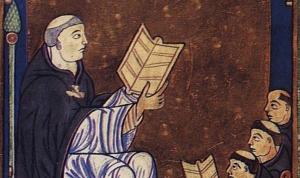
Hugh of Saint Victor was a priest from 12th century Germany. He joined the Abbey of Saint Victor in Paris, where he lived in community with other priests. Saint Victor’s Abbey was a newly formed home to such priests, originally a kind of clerical retirement home. The clergy there followed the rule of Saint Augustine, by that time an 800 year old guide to life in religious community. The original code was written by Augustine himself who, doomed to a bishop’s busy life, never got sufficient opportunity to put it into practice.
By the time Hugh came to live at the abbey, it had become a place of peace, prayer, and theological contemplation for priests who had discerned such a vocation.
Hugh is a good guide on our diagonal way, especially as he shows how each step of our life of faith helps us regain perspective on what we thought we’d left behind. I’ll say more about that another time.
The Two Threes
This week I’m reading a short meditation that he calls “The Five Sevens.” He loves patterns of numbers, much like his hero Augustine did. It helps as a mnemonic device, which the medieval scholars were always discovering. If you can remember the pattern, you’ve got 35 distinct meditations to assist you in your journey with God!
But five is, let’s be honest, a lot of sevens. Hugh wants to show us the pattern overlaps between
7 Deadly Sins
7 Petitions of the Lord’s Prayer
7 Gifts of the Spirit
7 Virtues, and
7 Beatitudes
While there’s plenty to digest in his little treatise, the pattern gets a little thin as he moves rapidly through his sevens. So for today, I’d like to share what he taught me that I was able to digest. Not all the sevens, nor even all of a seven, but the overlap between the first three sins and the first three petitions. So in place of the Five Sevens, here are the Two Threes of Hugh of Saint Victor.
Deadly Sins
Pride
Like Augustine, Hugh says that most sins begin here. (Augustine nuances his account when he says that some sins begin in despair—this coincides nicely with a key intervention from early feminist theology.)
But what is pride, for Hugh? “Pride is the love of one’s own status, when a soul loves the good that it has on its own, that is, without him from whom he accepted the good.” When we are taken over by this sin, we are like a stream that forgets the headwaters from which it springs. We name ourselves as our own source, our own author. In this way, Hugh says, the sin of pride takes God away from our contemplations.
Jealousy
Pride leads to jealousy. If I think I am an autonomous source of the good that comes from me, I am not likely to be pleased when I see good coming from or to others. I will not follow the Apostle’s advice, rejoicing with those who rejoice. Instead I’ll mourn when others rejoice. “Because he has refused to love a good for the common benefit of all, he now rightly wastes away in the envy of another’s good.” Like Cain of old, I don’t even seen this other as a true person anymore; I only see them as my competition.
If pride takes God from me, jealousy takes my neighbor.
Anger
Jealously leads to anger. Consumed by the good things that it lacks, “the unhappy soul is now angered on account of its own imperfection.” I’ve lost the capacity for gratitude not only for my neighbor’s joys, but for my own as well.
In pride, Hugh says, we lose God. In jealousy, we lose one another. With anger, we lose ourselves.
The Our Father
The antidote to these poisons are the petitions of the Our Father. (Well, the first antidote. There are more sevens!)
Petition One
Hugh points out the way the first petition, “Hallowed by thy name,” returns us to the source of all good gifts. “For this request the spirit of the fear of the Lord is given, so that he, coming to the heart, might create in it the virtue of humility, which may heal the sickness of pride.”
It could even become a mantra. I’ve done something I’m proud of: Hallowed by thy name.
Petition Two
“Thy Kingdom come” is a petition that asks God to bring the riches of heaven to everyone. The one praying “asks for the common salvation of all,” and so “shows that he rejects the vice of envy” or jealousy. I can’t ask God to bless you, and then go on “losing you” through my own envy.
Here’s another mantra. You have received an honor: May God’s Kingdom keep coming to you.
Petition Three
Finally, the petition “Thy will be done” is for Hugh a remedy against anger. There is much that might give us cause for anger, including our own unjust treatment. This prayer doesn’t ask us to ignore those things, but rather it invokes God’s presence as a companion. I can trust God’s will over and beyond the thing that is damaging me in this moment. “Through this, the spirit teaches him not to become angry against the creator, whatever he might endure in evil or lack in goods, but to show his ability to tolerate adversity through everything.”
Here is our third mantra, and perhaps the most difficult. I am aware in a moment of the good gifts that I lack: “Thy will be done on earth as it is in heaven.”
The Two Threes of Holiness
These Two Threes will be my companion over the next few weeks, as I pray prayers to encourage myself to overcome sin with God’s gifts. For me, today, Hugh of Saint Victor, the twelfth century spiritual guide, is one of those gifts.











